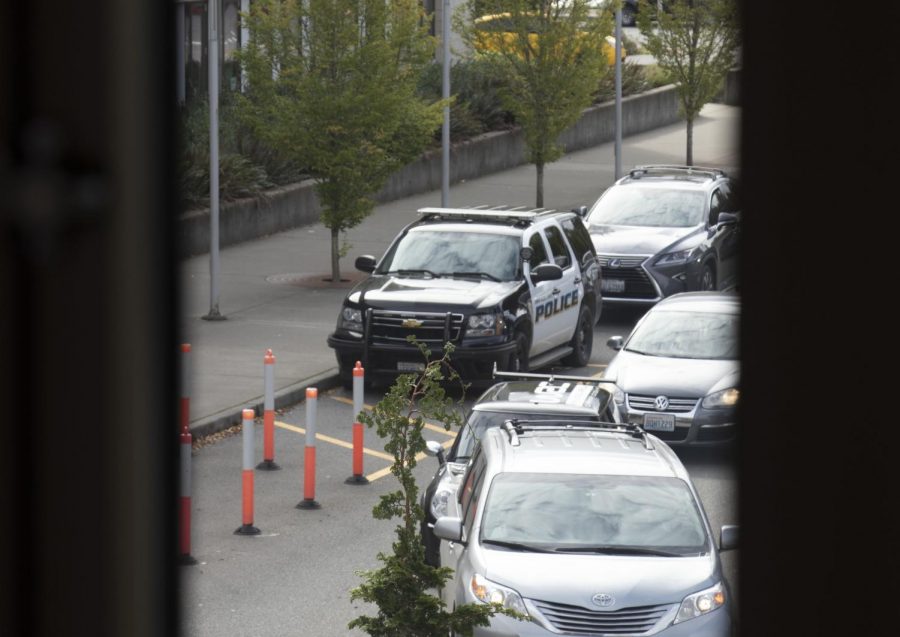Chaos at Newark Airport: Evaluating Complicated Situations for Nuanced Takes
AN AIRPORT IN FRENZY! Police followed the call of emergency to Newark Airport only to find a false alarm, called for alternative reasons.
September 27, 2019
On September 2, the Newark airport erupted into chaos as a lone cry out to “evacuate” filled the gate. According to CNN, “Nearly 200 passangers evacuated the gate,” while police were called to the scene. But when they got there, no apparent threat could be found, no bullet or bomb in sight. Officers were told to look for two individuals-a pair of East Asian men supposedly working together-who were a threat to the safety of the patrons at the gate. The reality of the situation, a warped perception of two strangers who were paired by their race and coincidence, all played out on the stage of an adrenaline pumped society, ready to sprint at the sound of a gunshot.
According to Buzzfeed News, Han Han Xue and Chunyi Luo both were waiting at their gate to board their flight from Newark Airport to San Francisco when an Alaska Airlines employee approached them. Luo says that she asked him, “Are you scared? Are you nervous?” After Luo backed away, the employee approached Xue. Buzzfeed News wrote, “How much are they paying you?” [Xue] said [the employee] asked him, not clarifying who “they” were. “Did they give you a visa? Did they give your family a visa? Do you make a lot of money? Do you work on Wall Street? Are you on an American visa?” Xue said she asked him.” The woman’s actions were described as increasingly erratic as she continued to remain suspicious of the two men. She then walked over to the gate agents at Gate 30, who in turn, paused the boarding of the plane. This is when the situation began to reach its climax. The airline employee began to shout “Evacuate!” and pressed an emergency button, causing the boarding area to erupt with chaos. In a tweet made by Josh Berman who was at the airport at the time, “For anyone who cares, a 1 word false alarm (“evacuate!”) caused 300 of us at #newarkairport to dive behind desks, crash through glass, and sprint for our lives to the nearest exit. All instinct. America 2019 is constantly being prepared for a maniac with a gun to blow us away.” After the evacuation of the airport, police surveyed the crowd looking for Luo and Xue. When the police had found them and had taken them to talk, according to another witness and Xue’s own account for Buzzfeed, she yelled, “We got them motherf—ers” above them from the jetway bridge. After questioning the two men and recognizing that they were not a threat, Luo and Xue were let go and airline goers were allowed back into the airport, and according to CBS 2, “Sources told CBS2’s Tony Aiello on Tuesday the flight attendant is bipolar and had an issue with her medication. Prosecutors said for that reason she would not be charged.”
There is a gut reaction that may jump out after reading of the event, whether it be the racist implications of the woman’s bias or the immediate panic of everyone in the airport gate–there is an instinct to immediately blame it on a single concept. However, in order to bring about change of any form, there must be discussion, and to have a productive discussion, there must be a deeper analysis than just pinning it on one issue. AP U.S. Government teacher Jacqueline Belur says, “A good start is an acknowledgement that racial profiling does exist, and I would say especially in a post 9/11 world when it relates to airports like Islamaphobia and that kind of profiling that we see happen… I think starting from the understanding that it does exist and looking to how people of color are treated differently than white people, then we can start accounting for how the airline attendant personal had mental health issues.” This is the first step to recognizing the many variables to this moment but also recognizing what cannot just be pushed to the side as nuances. AP U.S. History teacher Kathryn Kelly elaborates that “the reality was, when [the airline employee] did end up reacting and acting out, it was against a certain group of people, these two men, and it definitely reflected something in some level inside of herself that she fears and or believes. So you saw an acting out of almost like a subconscious belief or fear and it was really upsetting. Obviously it was upsetting for her but these guys weren’t doing anything wrong and it was quite upsetting for them.” It is unreasonable to act blindly on rage and say that this woman should lose her job and never work again, but at the same time, she should be held accountable for her actions. This case is not just a matter of pure racial profiling but rather being placed into a situation where racist biases, previously silenced, come out in an ugly matter. It is moments like these where the importance for discussions and trainings around race and unconscious bias is emphasized, especially when there are many people relying on specific workers for security and safety. World History and Psychology teacher Jordan Frost says, “I think it is important not to rush to judgement and take in all the facts. That is the problem with releasing headlines before we actually have facts to back it up. We can both be compassionate for the airline employee and have greater discussions about profiling.”
Would yelling “evacuate” in an airport gate pre-9/11 have the same effect as it did today? Before the Patriot’s Act and Transportation Security Administration (TSA), before the scanning and X-rays, how did America become so stressed? Head of campus security, Neil Lasher describes the changes he has had to make saying, “It’s stressful. The games have changed. I used to come to work in shorts and a t-shirt but now I have to come in full uniform. Now we have body armor and new training, panic buttons, it’s just a new world. It’s stressful. There is no normal day anymore. It’s nerve wracking. Unfortunately as criminals and people with ill intentions change their game, we have to change, too.” What is saddening about what happened in the Newark Airport is that the people who were evacuating were very likely expecting the worst. So often do headlines of domestic terrorism and mass shootings weigh down on the American people. Kelly says, “I think that it’s really interesting to think about, it’s not that self care is bad–self care is great–it’s just that we have active industries now based on self care, and that tells you that as a society we are not people that feel cared for anymore. And in fact I’d argue that not only are we not a society that feels cared for, we are a society that feels threatened a majority of the time and that’s, once again, really sad.” This has been the life for the current generations but it has not always been like this. Even as tragedies continue to happen–real or assumed–what we can continue to do is talk through the world around us and walk towards making change.




